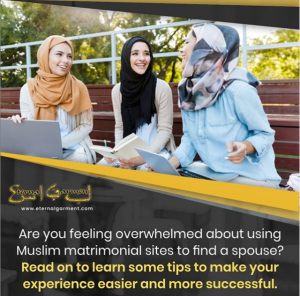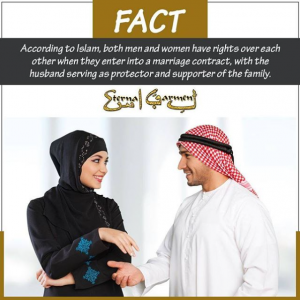From www.EternalGarment.com
In our humble opinion, below are a few pieces of advice to keep in mind, that will insha’Allah be beneficial while you seek a good compatible spouse for a successful and happy marriage…
1. First and foremost, constantly make sincere du’a to Allah (swt) for a good spouse who will be the best for you for this world, and for the hereafter. Our Prophet (saw) advised us that we look for spouses who have piety and good character above everything else.
2. Always be honest with the prospective match you communicate with. Deceiving others with lies might get you far into a relationship, might even get you married. But a marriage based on the foundation of dishonesty will never prosper! So please always be 100% honest.
3. If any member ever asks you for money, or acts in a disrespectful and/or abusive way, please report that member to the website authority as an “Abusive Member”.
4. Put up a picture of yourself. Profiles with pictures will always get much more attention! Feel free to password-protect your pictures if you have that option. This way, you control exactly which member(s) can view your pictures.
5. Login to the website frequently, and respond to interested members quickly. If you take too long to respond, you would appear not interested, and interested members will move on to other prospects.
6. Be respectful and polite as you communicate. DONT come across as too aggressive, flirtatious, or too needy! Be humble, yet maintain self-respect and dignity.
7. Be realistic as you search for a spouse. Nobody is perfect, so don’t expect your spouse to be perfect in every way. As humans we are bound to have strengths, and some weaknesses that we can improve upon. So prioritize what is absolutely important to you without asking too much.
8. As you are getting to know one another, consider discussing the following:
a. Discuss your spiritual and religious beliefs and goals. What are your views on music, hijab, zabiha meat, following a certain madhab (school of thought), etc? Discussing these issues ahead of time will help determine your religious compatibility and minimize major conflicts in future.
b. Clarify future role expectations. It’s important to talk about the roles and responsibilities of each partner in marriage – For example, who will take care of the finances, chores, etc? Discussing roles early on will save you from numerous arguments in the future.
c. Identify any family of origin issues. Don’t assume your spouse will see things exactly as you do, because you may have had different cultural upbringings. Explore topics such as (respect and influence of your parents in your marriage, joint families, raising kids, etc) to better comprehend and agree upon certain cultural expectations.
d. Discuss communication and conflict resolution skills. Couples that communicate effectively can resolve conflicts more gracefully. This will enable you to spend less time arguing and more time resolving.
e. Develop personal, couple, and family goals. You are committing to share a life with someone. Isn’t it important to discuss what you want your future to look like together? Where do you want to be in 3, 5, or 10 years? How many children do you want to have? When do you want to go for Hajj? Outlining a plan for life can be a wonderful way to learn about each other.
f. If at all possible, consider seeking “Pre-Marital Counseling”. For those that don’t have easy access to a muslim counselor, we found: pre-marital counseling
9. If you are previously married, then realize that your ex-spouse may also be a member on the matrimonial website. In that case, please be extra mindful and respectful of them, and DONT contact them or speak bad of them to others!
10. If you have been previously married and looking for re-marriage, (if you haven’t already done so), we encourage you to reflect upon your past marriage/relationship, and carefully analyze what mistakes you may have made, what you could have done better, and what improvements you will insha’Allah make next time. Discuss these topics with prospective matches to find proper compatibility.
11. When creating your profile, put useful information in the “About Me” section, and “What I am Seeking” sections. Those are the two most important sections that prospective matches will read.
12. When filling up the “About Me” section:
a. Try to be creative to catch the reader’s attention, and don’t hesitate to display your individual style. Don’t write a short boring line or two that looks typical. Be different. Be Yourself.
b. Present a comprehensive image of what you are all about, and highlight 3-5 of your good characteristics. Especially mention some things about yourself that may be unique.
c. Feel free to mention 1 or 2 of your weaknesses (if any) that you are trying to improve upon. It shows humility, and it also helps to present a true image of oneself, instead of painting a fake unrealistic picture.
13. When filling up the “What I am Seeking” Section:
a. Again be creative, and gain the attention of the reader by your unique personal style.
b. List 2 or 3 things that you would definitely like in a prospective spouse (“the must-haves???).
c. Feel free to also list a few things that are nice-to-have, but not an absolute must.
d. When you eventually communicate with prospective matches, be very honest about the qualities/traits that you would like to avoid.
14. Consider taking the “Myers Briggs Personality Test” located at: http://www.humanmetrics.com/cgi-win/jtypes2.asp.
a. It may appear somewhat silly and useless, but amazingly, it might reveal things about yourself that you never realized. Click the following link to understand what your personality type reveals
b. More importantly, based on what personality type you have, you may find suggestions about which personality type(s) will be a good match/complement for you. Feel free to ask a prospective match to take the Myers Briggs test as well, if they haven’t already done so. In our opinion, it is extremely beneficial and insightful. So please do take the test.
c. Very detailed info on Meyers-Briggs personality test here.
15. Finally, please ‘Spread the Word’ about our website www.EternalGarment.com to other friends, family, and community members. Please help us get the word out about this very needed and beneficial service to the entire Muslim ummah. Jazak’ Allahu Khairan.
Feel free to LIKE our Facebook Page.
Please also follow us on Twitter @egarment.
We hope and pray that the above few pieces of advice will be useful to you as you seek your life partner (on a matrimonial website), who will insha’Allah be the coolness of your eyes… Ameen. Till next time, Salaam Alaykum.


